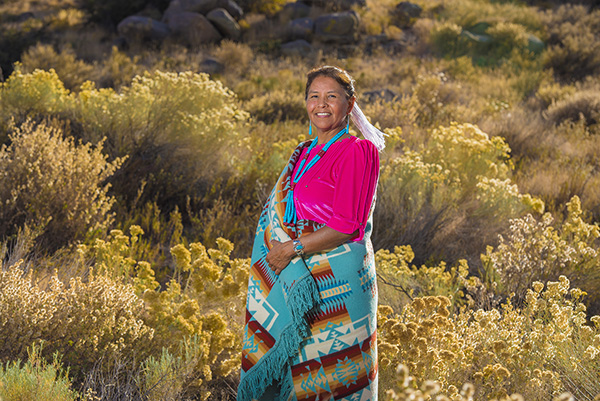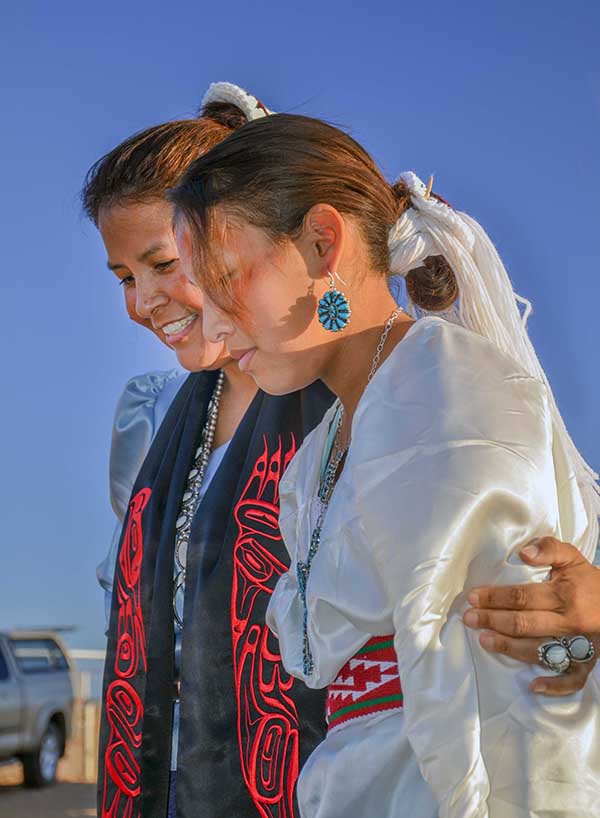Sandia diversity specialist wins inaugural award from AISES

MARIE CAPITAN has won the first-ever Blazing Flame award from the American Indian Science and Engineering Society for blazing a path for Native Americans in science, technology, engineering, and math education and careers. Marie is a workforce diversity specialist at Sandia, where she has worked for the past 15 years. (Photo by Randy Montoya)
Introducing the first honoree of the Blazing Flame Award from the American Indian Science and Engineering Society (AISES) requires a customary introduction. Translated from Navajo: “They call me Marie Capitan. I am Navajo and Alaskan. I am born to the Water’s Edge People clan and born for the Alaskan People,” says Marie.
A diversity workforce specialist at Sandia, Marie says such introductions serve multiple purposes like finding relatives and announcing clan and place of birth. Connecting people from wide-ranging backgrounds, religions, races, and cultures is Marie’s area of expertise. The programs she has developed at Sandia foster trust, teamwork, and productivity.
The Blazing Flame Award honors a professional who has blazed a path for Native Americans in science, technology, engineering, and math (STEM) education and careers. Marie is the eighth person from Sandia to be honored by AISES, a national nonprofit dedicated to increasing the representation of American Indians in STEM. She is one of five professionals from across the nation who will be honored at the 2016 AISES National Conference in Minneapolis this week.
A path to move forward
As the first person to receive this honor, Marie says she is incredibly humbled, and she never thinks about winning awards. She says what speaks to her is the name’s meaning.
“The symbol of the blazing flame is powerful,” Marie says. “When I think of the mistreatment that happens in families, or when relationships become unproductive at work, people may feel like they are living in a dark shadow. The flame lights a path for us to move forward. For me, it’s the idea of reconciliation and healing.”
I am very grateful for her teachings because they have helped me throughout my life.
Marie was born to a single mother on the Navajo reservation in Utah. Her father, an Alaska Native, was killed in a motorcycle accident before her second birthday. Marie was shuttled back and forth from the reservation in Aneth, Utah, to Albuquerque. She settled in Albuquerque when her mother got her first position as a labor and delivery nurse.
Marie says her mother was part of a generation that was told to reject her native teachings, and was forced to assimilate.
Marie’s grandmother, Frances Capitan, was her role model.
Despite her mom’s objections, Marie says her grandmother taught her Navajo traditions. She tutored Marie in language, storytelling, making fry bread and tortillas, hospitality, the role of women and men, and the importance of honoring elders.
“I am very grateful for her teachings because they have helped me throughout my life. I learned about leadership, compassion, generosity toward others, and courage to stand by your core,” says Marie.
When Marie’s mother remarried, life got harder. Her stepfather was cruel. “He would say, ‘You’re not my daughter,’” Marie recalls, and he expected her to care for her half-sister. This meant that as a child, she was responsible for cooking, cleaning, changing diapers, and washing clothes while her parents were out. Marie says, “I had to grow up very fast. Even though I resented it at the time, the great part of caring for my sister is that it taught me how to care for others.”

Marie Capitan with her daughter during her Kinaalda ceremony, a celebration of womanhood in the Navajo tradition.
Excelled in science at school
Marie graduated from Eldorado High School in Albuquerque, where she excelled in the sciences. She says she loved physics, chemistry, and biology. She saved up enough money to pay for her first year of college, but when the money ran out, she seized an opportunity in Washington, D.C., with American Indian National Bank. A few months later she accepted a position with the Bureau of Indian Affairs (BIA).
“Being the first in my family to go to a university, I found myself charting my own way. Looking back, I didn’t realize there were scholarship opportunities for college,” Marie says. “I thought it was my sole responsibility to pay for school.”
After working at the BIA in Washington, Marie transferred to the Albuquerque district of the BIA as a secretary and a federal police officer. She was the only woman police officer in the BIA Albuquerque district.
What I enjoyed about law enforcement was the ability to protect people.
“What I enjoyed about law enforcement was the ability to protect people,” Marie says.
Eventually she was recruited to work at the Albuquerque Police Department (APD). She served in the patrol, forensics, recruiting, and felony investigations divisions. Working while raising her son, Marie persevered, taking night classes at Central New Mexico Community College and completing her bachelor’s degree in criminology at the University of New Mexico.
Recognized and sought after for her expertise
Following seven years with APD, Marie’s investigative experience transferred to Sandia, where she accepted a position in Sandia’s Equal Employment Opportunity office, 15 years ago.
Since then, Marie’s work as a diversity workforce specialist has had a lasting impact on some 10,000 employees. She helped develop the Labs-wide Diversity and Inclusion programs with senior manager and chief diversity officer Esther Hernandez.
Esther says, “Marie is recognized and sought out for her subject matter expertise. She has made great strides in providing learning and awareness options for everyone at Sandia. Marie has a way of honorably using what she has learned in life and through her culture to help others.”
In the community, Marie inspires local native middle and high school students to pursue education and careers in STEM. For nearly 10 years she led Sandia’s Dream Catcher Science Program, a hands-on learning outreach for students and their parents. She is also a member of Sandia’s American Indian Outreach Committee.
An exemplary role model
“Marie has a true passion for diversity and inclusion, and we would like to extend our heartfelt congratulations,” says Div. 3000 VP Melonie Parker. “Marie has served as an exemplary role model. Her many years of service and dedication to the community have made an impact by exposing underserved minority students to STEM education and careers,” Melonie says.
Louis Papponi (10626-3), a business management professional who has teamed with Marie on multiple projects at Sandia, says, “It has been an honor to have worked and partnered with Marie. Her excellent commitment to customers, peers, and all members of the workforce is second to none. She has helped me grow and develop my own professional identity.”
My job is connecting people and creating that path; creating a light.
Marie has also mentored several business interns. Melanie Gallegos (3001), a human resource intern who worked with her, says, “Marie empowered me every day to work hard and provide exceptional impact to our organization. She is an inspiration to work with. She cares greatly about those around her, and will go out of her way for anyone in need.”
Marie says the most rewarding aspect of her job at Sandia is creating space where people can ask questions and engage conversations — even the hard conversations. “Diversity and inclusion fosters input and ideas from all employees, which in turn helps our organization be competitive,” says Marie.
Thinking again about the image of a blazing flame, Marie says, “My job is connecting people and creating that path; creating a light.”